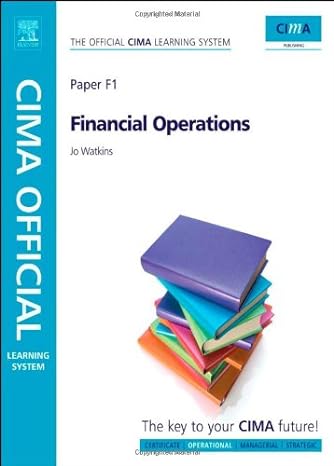Answered step by step
Verified Expert Solution
Question
1 Approved Answer
Required information [The following information applies to the questions displayed below.] Warnerwoods Company uses a perpetual inventory system. It entered into the following purchases and
Required information [The following information applies to the questions displayed below.] Warnerwoods Company uses a perpetual inventory system. It entered into the following purchases and sales transactions for March. Date March 1 March 5 Activities Beginning inventory Purchase March 9 Sales March 18 March 25 March 29 Purchase Purchase Sales Units Acquired at Cost 160 units @ $52.20 per unit 255 units @ $57.20 per unit 115 units @ $62.20 per unit 210 units @ $64.20 per unit Units Sold at Retail 320 units $87.20 per unit 190 units @ $97.20 per unit Totals 740 units 510 units 3. Compute the cost assigned to ending inventory using (a) FIFO, (b) LIFO, (c) weighted average, and (d) specific identification. For specific identification, units sold include 95 units from beginning inventory, 225 units from the March 5 purchase, 75 units from the March 18 purchase, and 115 units from the March 25 purchase. Complete this question by entering your answers in the tabs below. Perpetual FIFO Perpetual LIFO Weighted Average Specific Id Goods Purchased Compute the cost assigned to ending inventory using FIFO. Perpetual FIFO: Cost of Goods Sold Date # of units Cost per unit # of units sold unit Cost per Cost of Goods Sold # of units Inventory Balance Cost per Inventory unit Balance March 1 255 at $ 57.20 160 at $ 52.20 = $ 8,352.00 at $ 52.20 March 5 at $ 57.20 Total March 5 March 9 Total March 9 March 18 Total March 18 March 25 Total March 25 March 29 Total March 29 Totals S 0.00 Compute the cost assigned to ending inventory using LIFO. Goods Purchased Date # of units Cost per unit # of units sold Perpetual LIFO: Cost of Goods Sold March 1 March 5 Total March 5 March 9 Total March 9 March 18 Total March 18 March 25 Total March 25 March 29 Total March 29 Totals unit Cost per Cost of Goods Sold Inventory Balance Cost per Inventory # of units unit Balance 160 at $ 52.20 = $ 8,352.00 S 0.00 Goods Purchased Date # of units Cost per unit # of units sold Compute the cost assigned to ending inventory using weighted average. (Round your average cost per unit to 2 decimal places.) Weighted Average Perpetual: Inventory Balance Cost per Cost of Goods Sold Cost per unit Cost of Goods Sold # of units Inventory Balance unit March 1 March 5 Average March 5 March 9 255 at $57.20 160 at $ 52.20= S 8,352.00 at $ 52.20 at $ 57.20 March 18 Average March 18 March 25 Average March 25 March 29 Totals 320 at S 87.20 = $ 27,904.00 at 115 at $ 62.20 0 at $ 62.20 0 210 at $ 64.20 $ 27,904.00 at $ 64.20 0 Compute the cost assigned to ending inventory using specific identification. For specific identification, units sold include 95 units from beginning inventory, 225 units from the March 5 purchase, 75 units from the March 18 purchase, and 115 units from the March 25 purchase. Specific Identification: Goods Purchased Cost of Goods Sold Inventory Balance Date # of units Cost per unit Goods Puchased # of units sold Cost per unit Cost of Goods Sold # of unite Cost per unit Inventory Balance March 1 March 5 March 18 March 25 Totals 160 at $52.20 = $ 8,352 at $52.20 = S 0.00 at $52.20 = $ 0.00 255 at $57.20 = 14,586 at $57.20 = at $57.20= 210 115 at at $62.20 = 7,153 $62.20 = 0.00 at $62.20 = 0.00 $64.20 = $ 13,482 $ 64.20 = at $64.20 $ 0.00 $ 0.00
Step by Step Solution
There are 3 Steps involved in it
Step: 1

Get Instant Access to Expert-Tailored Solutions
See step-by-step solutions with expert insights and AI powered tools for academic success
Step: 2

Step: 3

Ace Your Homework with AI
Get the answers you need in no time with our AI-driven, step-by-step assistance
Get Started


